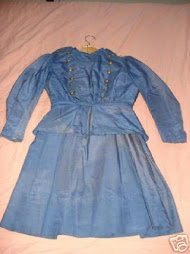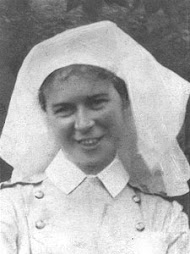"There is a 90-year-old legend in the North Wales town of Bodelwyddan. On some nights you can hear the sound of soldiers marching through the town, but if you look, none can be seen. The soldiers are the spirits of Canadian troops that rest in St. Margaret’s Churchyard in the town. 208 Canadian soldiers are buried there, most of them victims of the influenza epidemic that was rampant in Europe and North America in early 1919." http://www.canadiangreatwarproject.com/writing/kinmelpark.asp
One of the “Canadian soldiers” whose ghostly footsteps may still be heard in Bodelwyddan is Nursing Sister Rebecca McIntosh, who died at No. 9 Canadian General Hospital in Kinmel Camp in March 1919.
Rebecca was born on January 29, 1892 into a farming family in Pleasant Bay, Nova Scotia. Her parents were Peter and Christy McIntosh and her family included older siblings Margaret and John, as well as a younger sister named Cassie and an elderly grandmother named Annie. All, with the exception of Annie (who was from Scotland), had been born in Nova Scotia.
Faith seems to have been an important part of Rebecca’s early life. She was a member of St. Matthew’s Presbyterian (now United) Church in Halifax, Nova Scotia, and her brother John (who she names as next of kin in her enlistment papers) was a Presbyterian minister. Many members of St. Matthew’s enlisted during the Great War. Several lost their lives, including M. Pearl Fraser, a fellow nursing sister who was killed in action aboard the HMHS Llandovery Castle (more about her in a future blog). Another notable member of that congregation was Will Bird, the famous WWI soldier and journalist who chronicled his experience of the war in numerous books and articles.
Sometime after graduating from high school, Rebecca attended and graduated from nursing school (although the school she attended is unknown). In 1914, she survived a serious bout of scarlet fever. By 1917, she was well enough to enlist in the CAMC. At the time of her enlistment in April of that year, she was 25 years old, 157 lb. and 5’8 ½”. Her father had died (perhaps he had also been affected by scarlet fever) and her mother was living in Bridgewater, Lunenburg County, likely with her son John.
On the 25th of April, Rebecca set sail for England on board the hospital ship HMHS Letitia (a ship that would later run aground and sink on a return journey to Nova Scotia). After arriving in Liverpool a week later, she was assigned to the Kitchener Military Hospital (later known as #10 General) located in a former workhouse in Brighton. It was a comfortable assignment, according to Dr. Charles Thrush, one of the physicians working there--
“We receive only wounded from the front and do not take local casualties. One of my duties is to meet all ambulance trains, inspect unloading, placing in ambulance and sending to hospital. It is very interesting…Brighton is a wonderful place. It is the chief summer resort for London, often called London-by-the-Sea. Every week-end the place is packed with visitors.”
Dr. Charles Thrush, Kitchener Military Hospital, letter to Dunnville Chronicle, June 3, 1917. Available at: http://www.canadianletters.ca/letters.php?letterid=7216&warid=3&docid=1&collectionid=299
In November 1917, Rebecca was admitted to Kitchener Hospital as a patient—suffering from terrible abdominal pain. She had acute appendicitis, but would not be operated on. It was apparent that her health was undermined by this illness, along with her previous experience with scarlet fever. All the same, she returned to active duty on the wards.
Rebecca enjoyed two week-long leaves while at the Kitchener Military Hospital—once in January 1918 and again in August. In December 1918, she received a new posting (she had signed on for the duration of the war and six months after) to No. 9 Canadian General Hospital in Kinmel Park Camp, Rhyl , on the northern coast of Wales. This was a transit camp for 17,400 Canadian soldiers waiting to be transported home now that peace had arrived.
It was a miserable, cold winter. A coal strike was on, and there was little fuel to heat the hospital wards, never mind the men’s quarters. The food the men were given was terrible, and local shops grossly inflated their prices, making it difficult for the men to afford to purchase better provisions. The soldiers were anxious to return home, knowing that those who got there first would have access to the few available jobs. Tensions in the camp grew.
To add to the misery, the Spanish Influenza was sweeping through Europe and North America. Kinmel Camp was not exempt from the terrible disease. The February 5, 1919, entry in the war diary for No. 9 General, reads:
“Influenza increasing rapidly in camp. Central part of hospital almost full—we have over 600 patients in hospital now. Admitted 49 yesterday and 55 today practically all influenza.“
The next day the writer reports: “Seventeen of the personnel of this unit are in hospital.” Rebecca McIntosh would join them in mid-February. She struggled for the rest of that month and into March, her breathing becoming more and more difficult. It wasn’t an ideal time to be sick—according to the hospital’s war diary, there was little coal and it was so cold that pipes had burst in the hospital and as a result, water had to be turned off in four of the wards.
As Rebecca lay in bed, another drama was playing itself out in the camp. On March 4, 1919, tensions in the camp finally boiled over and the men rioted. Local shops were looted, “loyal” troops fought with the rioters, five Canadians were killed and 28 wounded. Fifty-one Canadians faced court marshal and 27 were convicted and sentenced from 3 months to 10 years.
It’s difficult to say if Rebecca was even well enough to know of all the tumult around her. The young nurse would never return to her Nova Scotia home. On March 8, the war diary for the unit read: “Nursing Sister McIntosh of this unit died in hospital today—influenza. This sister was very popular with the unit; a true nursing sister devoted to her duty. She will be greatly missed by all.” (http://data2.collectionscanada.ca/e/e061/e001517421.jpg)
Rebecca McIntosh is buried at Bodelwyddan (St. Margaret) Churchyard, in Flintshire, Wales.
Subscribe to:
Post Comments (Atom)






















Rebeccas grave will be visited in Sept 2013 by members of the JTR Rhyl forum who are ex members of the camp in Kinmel Park when it was a Boy Soldiers training camp from 1962 until 1972 .The forum can be found here http://jtrrhyl.fr.yuku.com/ I can be contacted at this address mrmartin@arcor.de
ReplyDeleteThank you for your thoughtful remembrance of my cousin Rebecca.
ReplyDelete